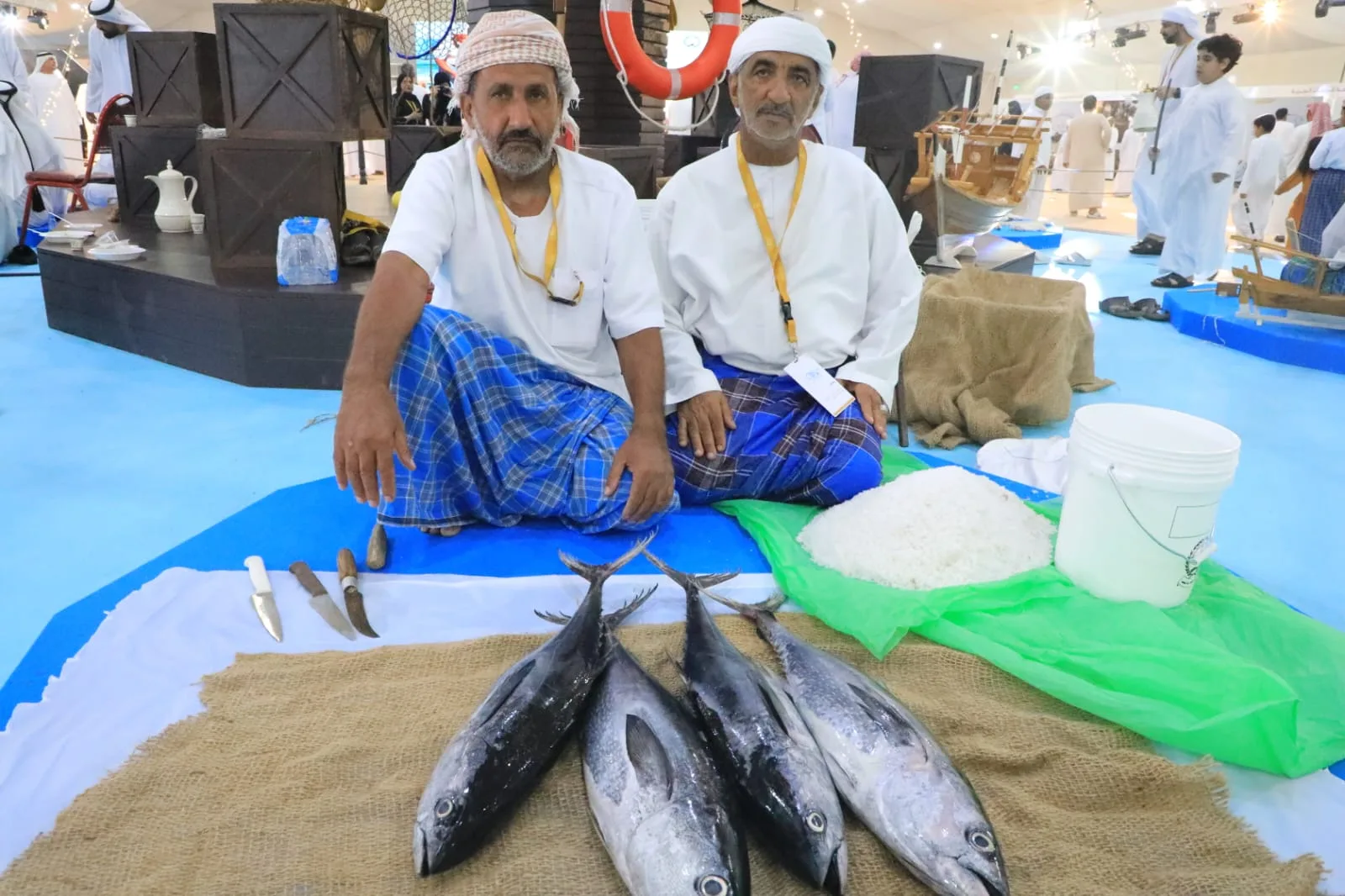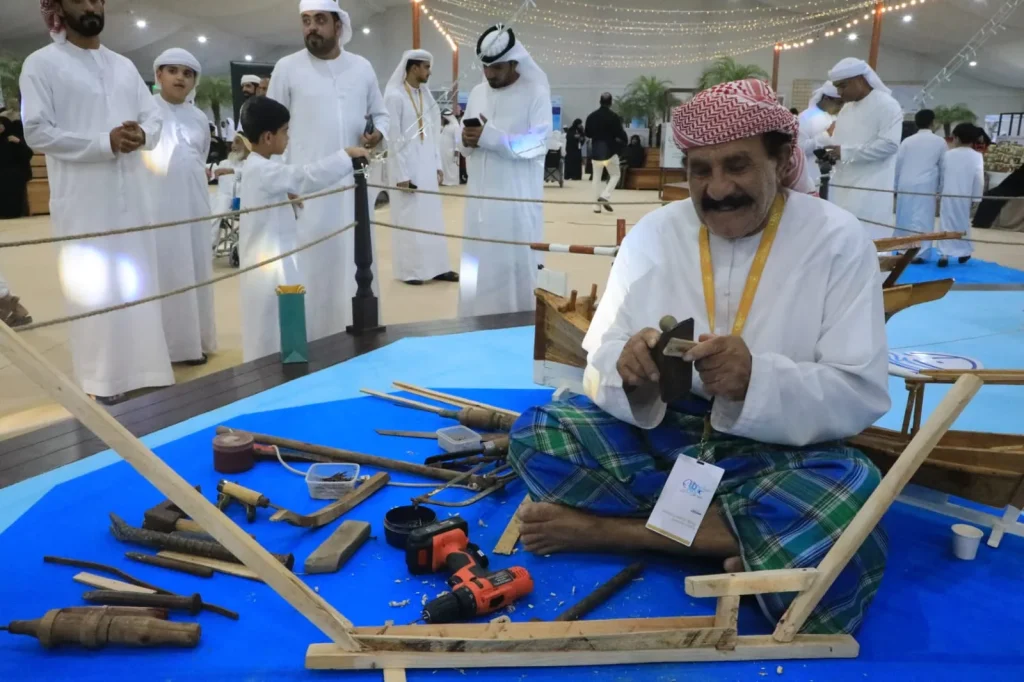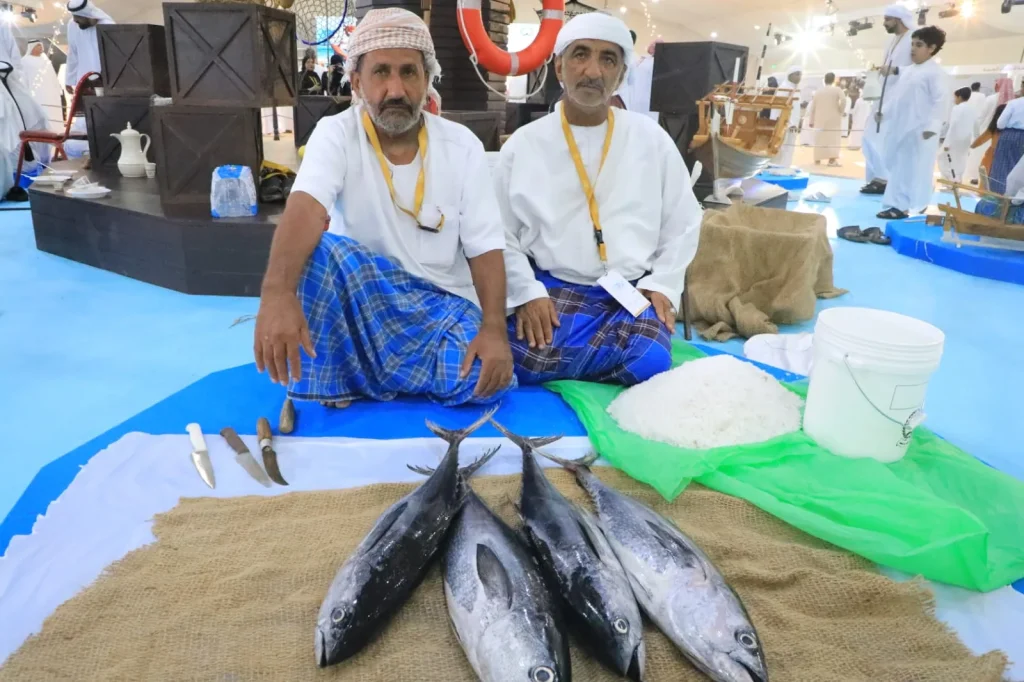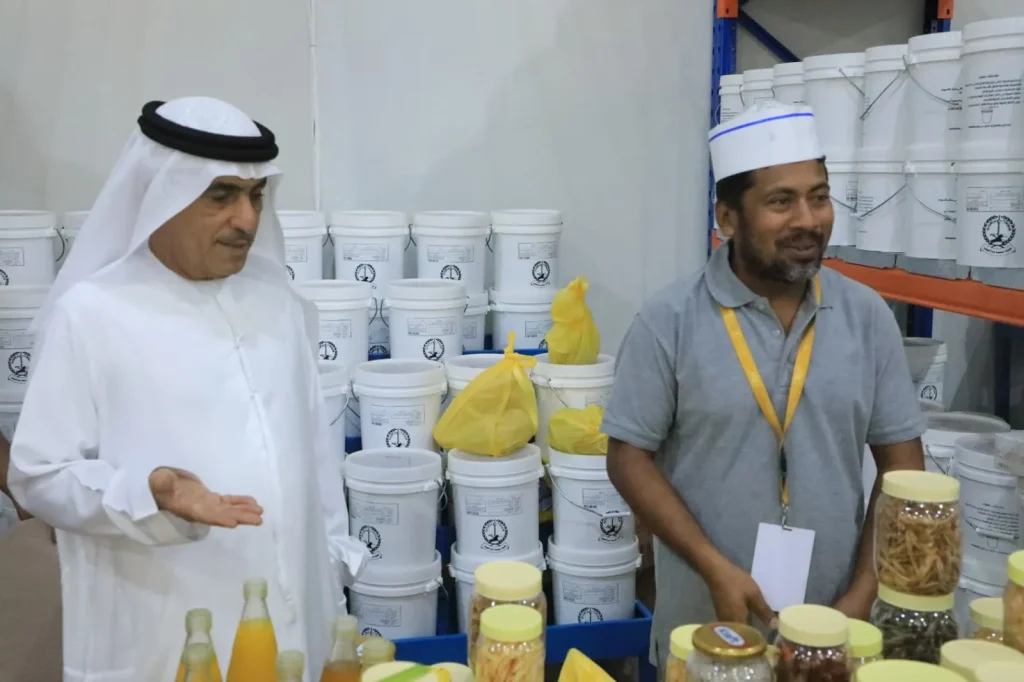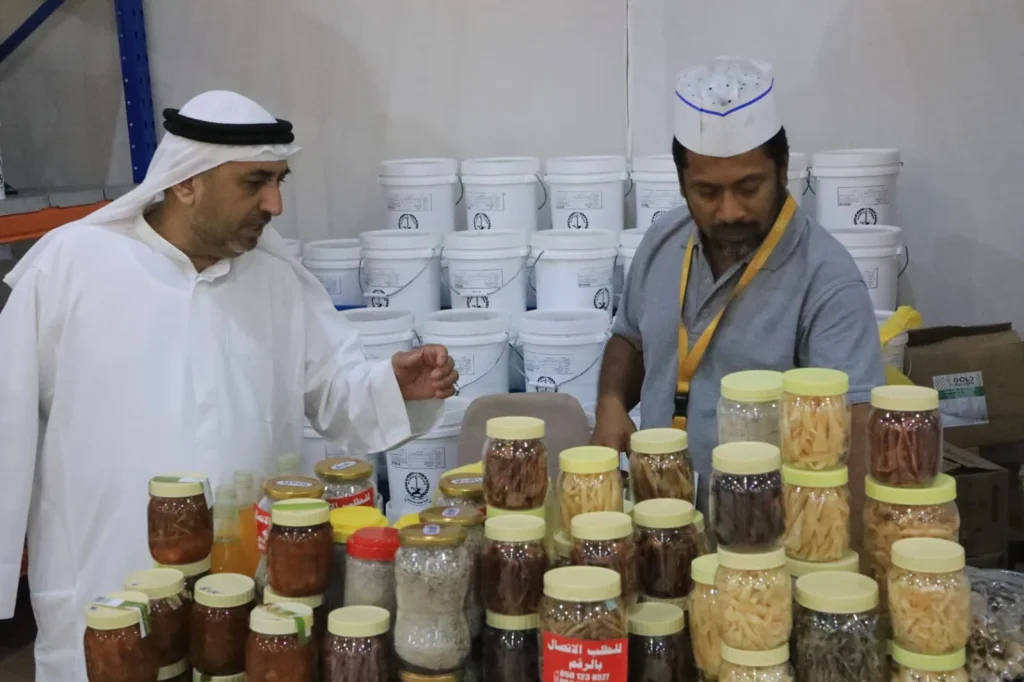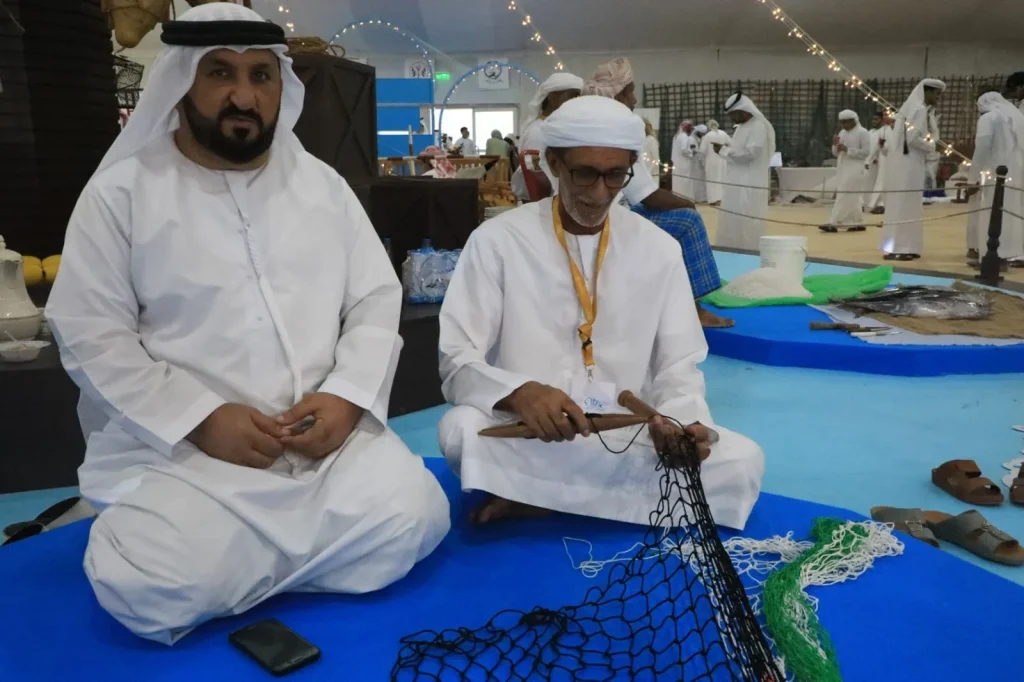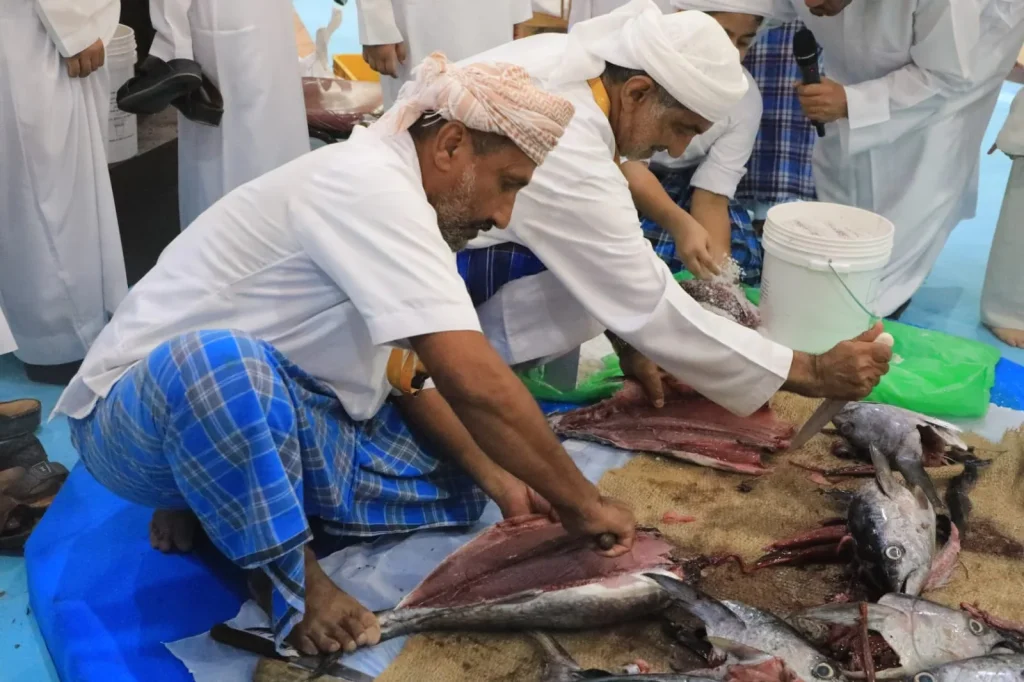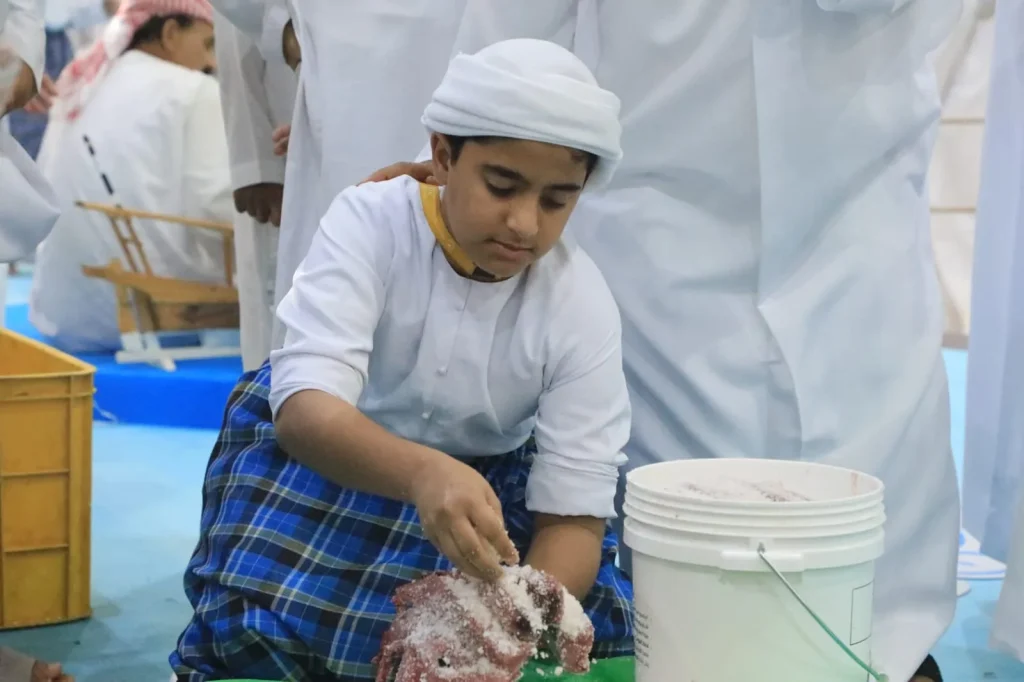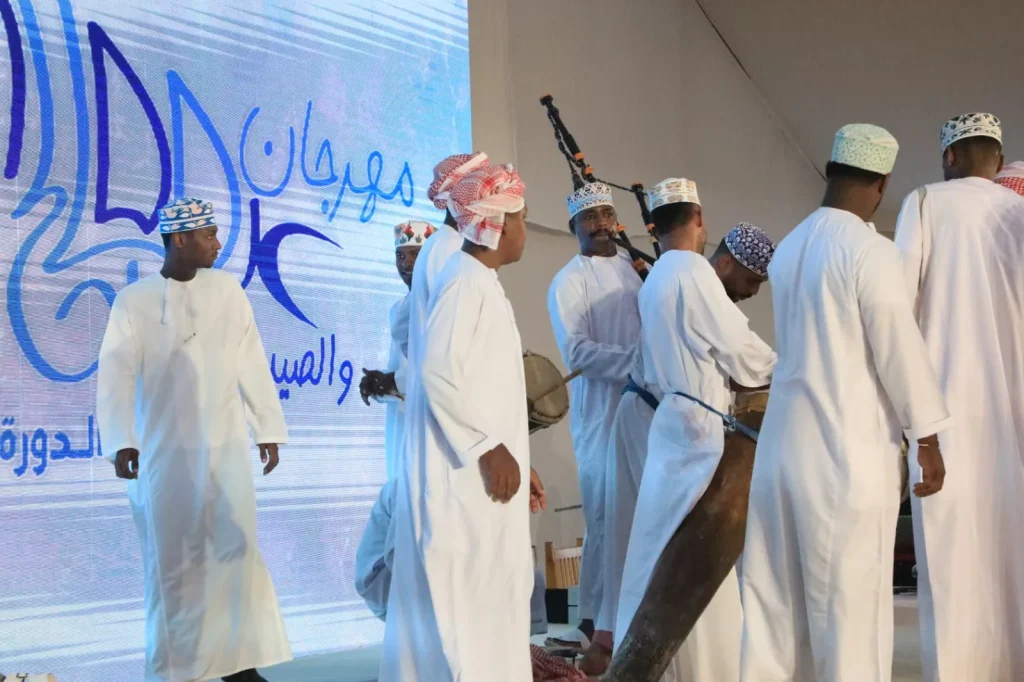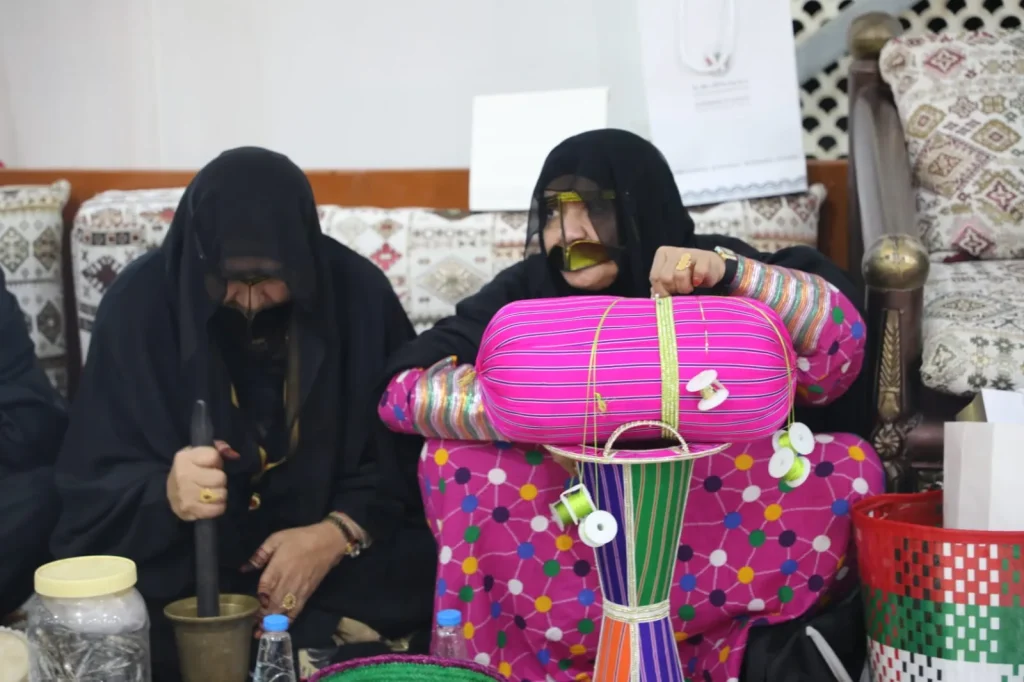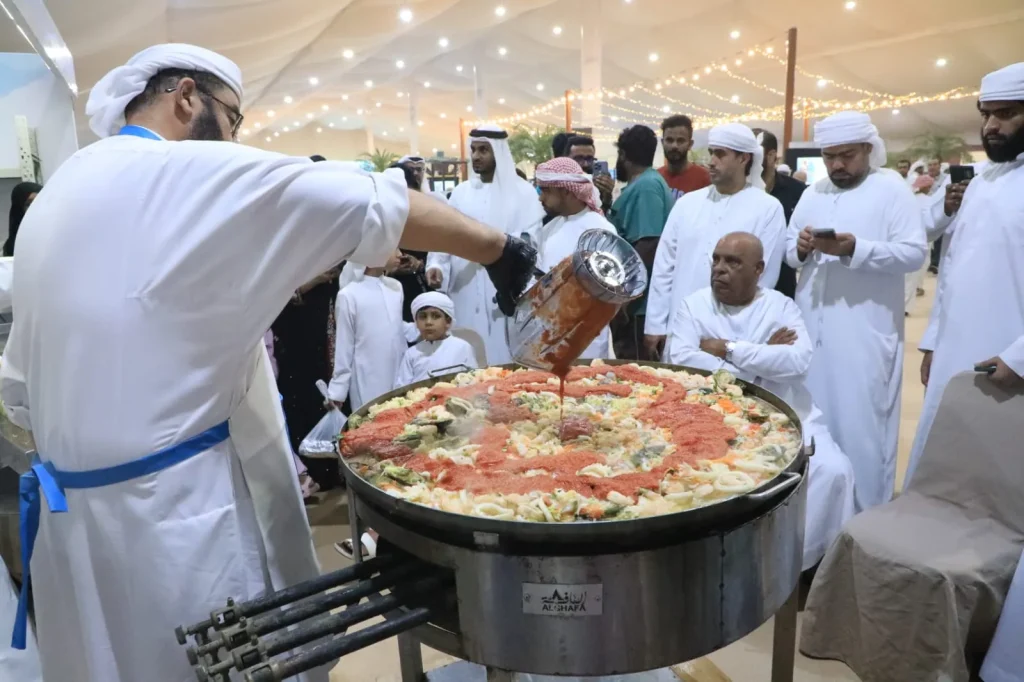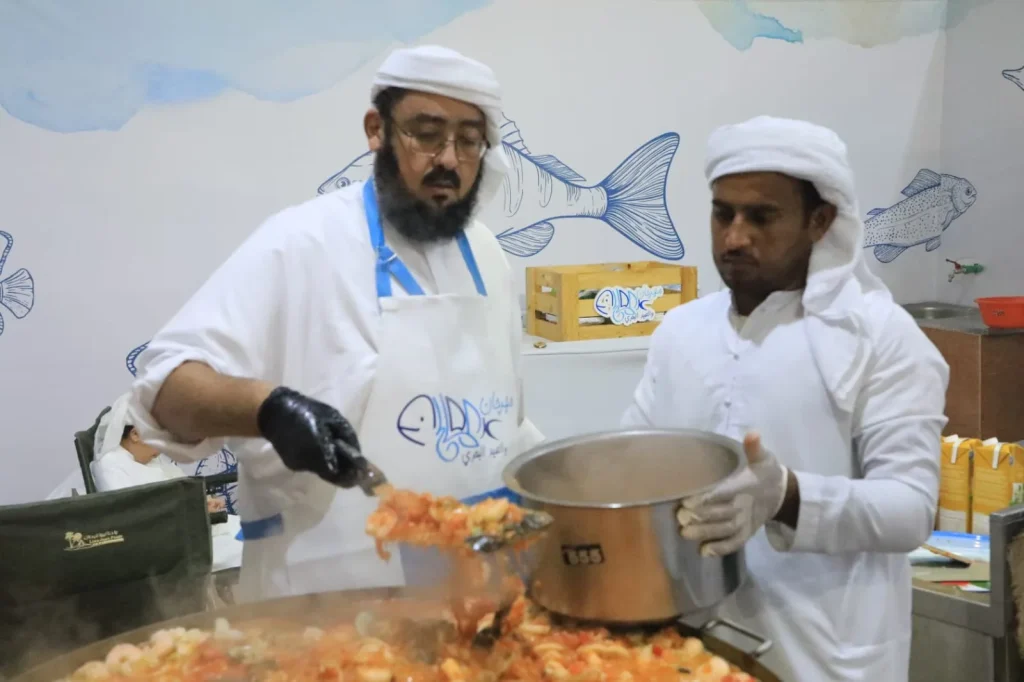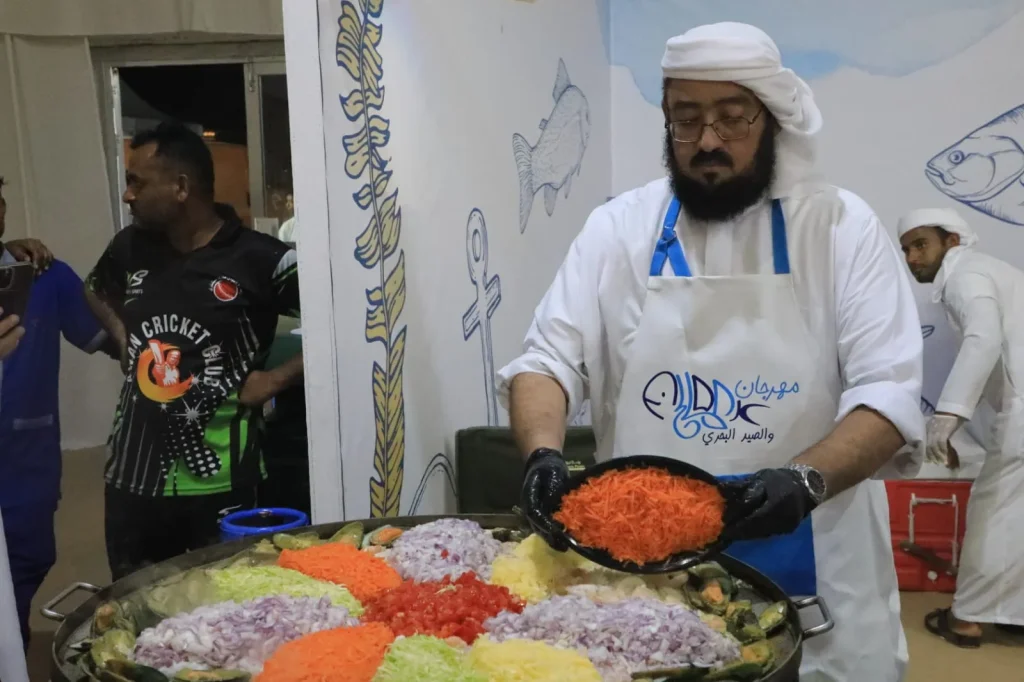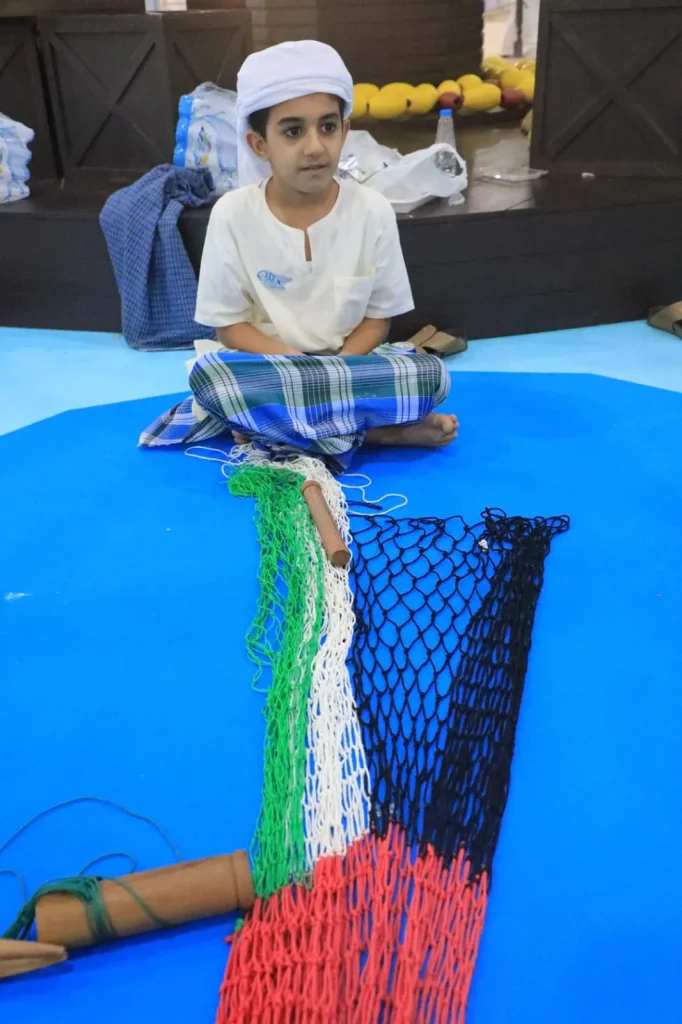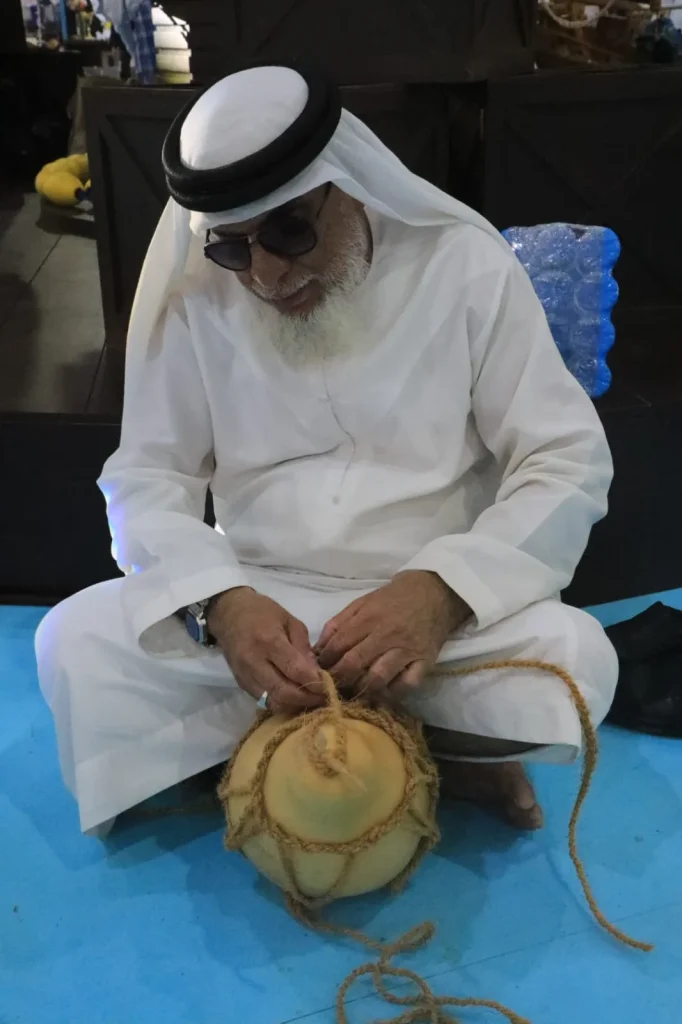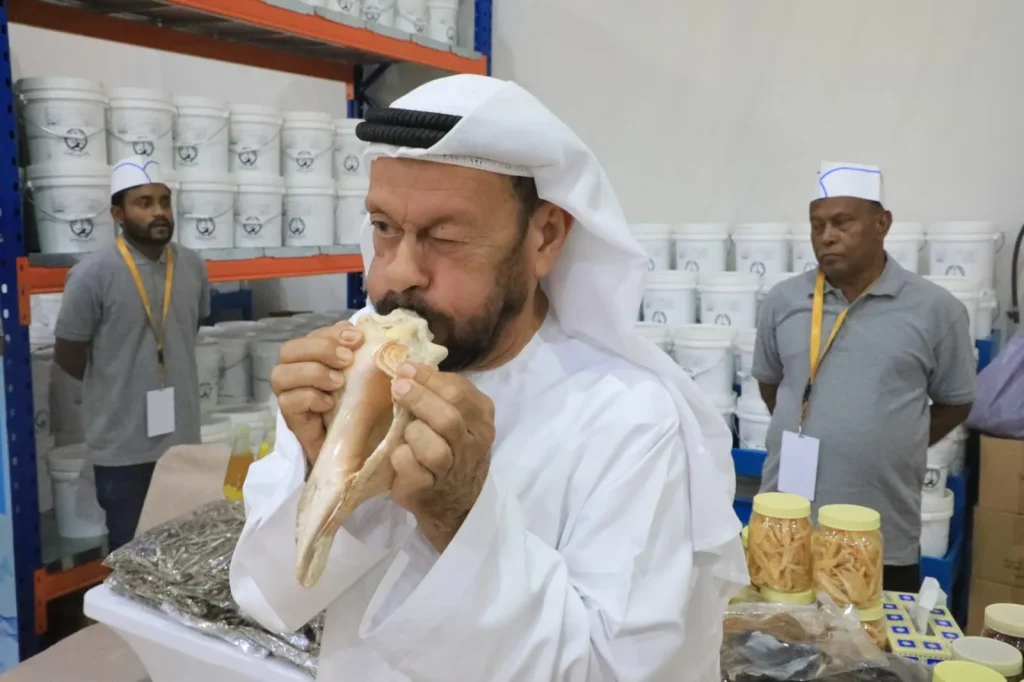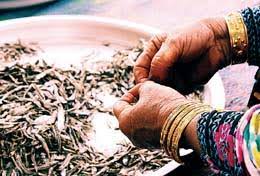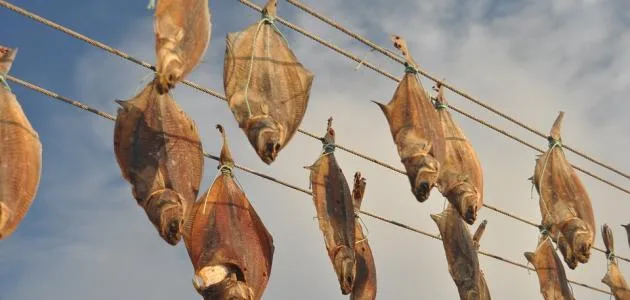United Arab Emirates
Emirate of Sharjah
Dibba Al-Hisn City Municipal Council
Cultural Heritage Inventory
(1) Al-malah Craft
The traditional crafts are ones of the most important pillars on which the lives of the people in the Eastern Region are based, in Dibba Al-Hisn City in particular. Despite the rapid development witnessed in various fields, this has not distracted its people from their maritime heritage and the traditional crafts for which they are famous, such as Al-Malah craft, a traditional crafts known to the people of the Emirates, especially the people of the eastern coast, whose lives were linked to the sea, through trade and fishing, which are not abundant in the waters of the Gulf, as the people of the region used to the salted fish (Al-Malah) in the past in order to maintain a stock of food sufficient for long periods. Al-Maleh craft is active in the summer and during seasons of abundant and low priced fish.
Salted fish (Al-Malah) craft is one of the oldest traditional crafts known by the people of Dibba Al-Hisn in the Emirate of Sharjah. Despite the advanced methods of preserving fish, the people still prefer the traditional method of preserving and drying fish, as the fish prepared for salting, compared to other fish, is popular because it can be stored for a long time. Al-Malah craft is active during the abundant and low priced fish seasons, as fishermen and experienced people store the famous local fish by salting them with coarse salt, where it is one of the most important ancient methods of preserving fish for the longest possible period. The demand for Al-Malah increases in the summer due to the scarcity of fish in the market and the reluctance of most fishermen to go out fishing, due to the high temperatures and the flee of fish to the depths. The increased demand for Al-Malah contributes to flourishing its production on the eastern coast, where Al-Malah production has become a distinctive feature in the Dibba Al-Hisn City in particular, which is an opportunity to harvest good profits for the merchants of Al-Malah producers, and over time this craft has developed and become widely popular throughout the Arab Gulf countries.
Preserving fish by salting is one of the ancient traditional knowledge, and people created it due to their need to eat fish when it is scarce or no longer available, that is, outside the season of availability, at times when it was difficult to go out fishing for climatic reasons, and also because many human settlements were far from the sea as some of them live in the mountains or valleys, at a time when modern means of transportation were not available, hence the fish drying and salting process is evolved to ensure its availability at any time. It is one of the human innovations, the people of the Emirates have used, in order to make delicious meals, especially since fish is the main meal, as it was eaten in the past with dates only when rice was not available. The continuation of drying and salting methods indicates a high sense of its importance, in terms of the abundance of the elements in the components of the species to be dried and salted, such as small shark meat and various fish, including fish eggs, as well as the humans resorted to use salting fish such as king mackerel and long tail tunas.
The salted fish (Al-Malah) is a food production that characterizes the heritage of the United Arab Emirates. All the Gulf heritage gained its importance from the fact that it represents food security, which contributed to warding off the food risks that threatened the society during the years of hardship and poverty. Therefore, it is not surprising that fathers and grandfathers were keen to pass on Al-Malah craft to their children.
Al-Malah is one of the delicious and desirable meals for people because of its distinctive delicious flavor. It is considered a meal that is not absent from the tables of the people of the Gulf countries in general and the UAE in particular. One of the sayings is “A nation that eats Al-Malah will never go hungry,” because the Arabian Gulf is full of all types of fish that can be used in the salted fish (Al-Malah) production.
People resorted to Al-Malah a long time ago, when modern means of cold storage were non-existent. Society resorted to salt as an effective substance for preserving fish for a long period, up to a full year.

Methods of preserving salted fish (Al-Malah)
The production of Al-Malah may seem on the surface to be an easy process, and everyone can do it, but in reality, it is not the case. Rather, the production of Al-Malah requires knowledge, experience and skills, which means that not every person can claim that he can practice Al-Malah production except for those who have experience and skill; Therefore, the element of Al-Malah craft is linked to the knowledge and practices related to the nature of the knowledge of producing and preserving food. The process goes through stages that require knowledge, experience, and skill, first in choosing the type of good fish that people desire, such as longtail tuna, king mackerel, eels, and other types, then preparing, salting, and preserving them in a pot, in addition to placing a quantity of pebbles helping in putting pressure on the fish inside the pot so that the water inside comes out to become solid, and then cover the pot tightly for about 70 days. When the pot is opened, the fish is immersed in the salt solution with the acquired desired smell and taste. Therefore, the preparation of “Al-Malah” in a good method so that it tastes delicious when eaten, and to retain its elements and taste without being spoiled. This depends on choosing the type of fresh fish suitable for salting, and the method of cleaning, preserving, sun exposing and the use of mountain or sea salt.
The time required to ferment Al-Malah is from 3 to 6 months. Al-Malah is fish preserved after being salted and placed in plastic containers non-reactive to salt.
Types of fish used:
- King mackerel (Kanad).
- Longtail tuna (Qabab).
- Eels (Saddy).
- Tuna (Yoder).
- Sea horses.
- Dorab wolf-herring (Al-Khabat).
The favorite types of fish:
(Al-Malah) is prepared from different fish, the most important of which are king mackerel, small and large sized longtail tuna, and small sized eels. The head and tail of the fish are cut off, then cut lengthwise into two halves, and slit from the inside with longitudinal lines. If the fish is large, to be cut into pieces, but not the small fish. The fish is cleaned by extracting its entrails, and then adding salt in quantities known only by those experienced in preparing (Al-Malah). Noting that not to wash the fish when used for (Al-Malah) production, as washing makes the fish lose the ability to secrete water helping in preservation as per the amount of salt added to fish, which helps to secrete water. The fish is then preserved in special containers placed in sun for three months in the summer, while in the winter they are exposed for four to five months.
One of the favorite types of fish is the king mackerel (Kanad), because its meat is white and plentiful, it can withstand salt and sun temperatures, its bones are few, it tastes delicious, and it is preserved for a long time, likewise, the longtail tuna has the same characteristics.
Stages of salted fish (Al-Maleh) production:
Al-Malah production goes through seven stages:
- Choosing the excellent type of fish.
- Cleaning the fish well, removing the fins, tail, head, gills, entrails and blood.
- Extracting the skeleton, i.e. thorns and bones.
- Cutting the fish into flat portions after removing the bones.
- Dissecting the fish pieces to allow salt to penetrate inside.
- Placing large amounts of coarse natural salt on the fish pieces.
- Placing the fish after salting in plastic containers or sealed plastic boxes to prevent air from entering, then to be exposed to the sun. The sun helps the fish slices become saturated with salt. The exposure to sun last for three months to make them edible. “In the past, they were kept in large clay pots called “Kharos” and then in tin boxes.” They were then sealed with a large piece of stone over a piece of cloth to seal and preserve the fish against heat and humidity.
Note: The time it takes to ripen varies depending on the season; in summer, due to the high temperature, ripening is faster, while in winter, ripening is slower due to cold weather.



Stages of Al-Malah preparation
Al-Malah production has remarkably developed during the past few years in Dibba Al-Hisn, especially with regard to adding flavors and spices according to the request and desire of the buyer. The latest flavor is (thyme-flavored Malah), which adds a special and distinctive flavor to the food. Many of Al-Malah lovers have begun requesting this flavor, in addition to (Al-Malah with lemon), (Al-Malah with pepper), and (Al-Malah with mixed flavors). According to Ahmed Abdullah Baghdad, the owner of one of the famous Al-Malah shops in Dibba Al-Hisn, there is an increasing demand for Al-Malah that has a specific flavor, and we are constantly receiving orders from inside the country and some Gulf Cooperation Council countries to prepare Al-Malah, especially (King Mackerel Malah), which are the finest types.
As for the method of Al-Malah production, as mentioned by the narrator, Baghdad, it goes through several stages, the first of which is separating the head of the fish, splitting it, and spreading salt tightly over each part of the fish so that it does not rot. The quality of salt and its nutritional value depend mainly on the method of salting, and then to be placed in plastic containers at the current time, in the past, it was stored in large “Kharos” called pottery “Phokhara”, and then to be emptied into cans “Al-Abiyab”, which are small cans made of metal, where Al-Malah to be stored for three to four months until to be cooked and ready to eat.
Types and prices of Al-Malah:
King mackerel is considered one of the finest types of Al-Malah because it resists the heat of the sun and does not rot easily. It remains in the can for more than ten months without spoiling or its nutritional value being reduced, and remains consistent, preserving its properties. The price of a can accommodating between 10 to 12 pieces of medium sized king mackerel Mallah are AED 350. Longtail tuna comes in the second place in terms of the price and demand due to its properties being close to king mackerel. The price of a box of large pieces of longtail tuna is AED 200, medium size pieces can of AED 150, and small size pieces can of AED 100. Each can hold ten medium-sized fish, of high quality and good taste. As for eels, it ranks the third in Al-Malah list with delicious taste, however, it has weak resistance and cannot withstand staying for more than three months inside the can, and if stayed more, it will show signs of spoilage and crumbles and loses its flavor. The price ranges from AED 70 to 90. As for cod fish, it comes at the bottom of Al-Malah list, and its price does not exceed AED 30 due to its poor quality and low demand.

Longtail tuna, a type of fish used to produce Al-Malah.
How to prepare Al-Malah for eating:
Washing it with boiling water and removing the skin of the fish along with the stuck bones, then putting it in a pot while pouring little water and lemon and covering for thirty minutes, after which it will be ready to eat with a plate of boiled white rice. This is the most popular method for eating Al-Malah; As for some people, they prefer it with Makboos. The flavors of Al-Malah have become numerous, giving customers new options with flavors that are not limited to Al-Malah only. Some flavor their Al-Malah with a lemon-lime flavor with salt only, and some use hot pepper, and others use thyme and some aromatic herbs. These are the options that meet the tastes of market visitors on the eastern coast.
Adding Al-Malah to be mixed with the onion mixture, stir the mix until it becomes like a dough. Add a little water and leave it for 3 minutes until it is cooked. If the fish is dry, add more water.
After that pour water to 80% and then mixing it with Al-Malah fish to complete cooking.
- A little rice.
- A layer of Al-Malah fish.
- A layer of rice.
- Then put a little ghee.
- Then put it in a bowl (cooking pot) for 20 minutes.
Abdullah Ahmed Baghdad said in an interview on February 6, 2024, about the method of preparing (Al-Malah), as a food dish, in Dibba Al Hisn city: “The pieces of (Al-Malah) are taken out of the water and washed twice, then boiled, cut into small pieces, and washed again until the appropriate desired amount of salt, to be eaten later with white rice, onions and lemon. It may be used in preparing (Mardouda), which is similar to (Saloonah), but it is characterized by using large amount of onions in it. Al-Malah is also served with (fried) rice to break the taste of sugar in it and other foods, indicating that in the past it was preferable to eat (Al-Malah) during the season of availability of dates and lemon, but at the present time , in light of the availability of all products outside their seasons, eating Al-Malah has become not limited to a specific season, in addition to that it has been introduced into innovating different varieties of foods”.
Types of Al-Malah cooked dishes:
- Al-Malah broth.
- Al-Makboos.
- Mugar.
- Eating Al-Malah with white rice.
- Mixing Al-Malah and rice in the same pot.
Al-Malah cooking recipe:
Al-Malah is placed in a pot of hot water, the water is changed twice, then to be boiled twice, each time the water is changed every five minutes, and a number of spices are prepared for it, including; Bay leaf, black pepper, cinnamon stick, cardamom pods, cloves, two cloves of garlic, two table spoonful of tomato paste, one table spoonful of mixed spices, one tea spoonful of turmeric, one table spoonful of coriander, green hot pepper, two tomatoes, two onions, two and a half cups of basmati rice, (Soak for a quarter of an hour), a quarter cup of fresh coriander, ghee or oil, if not available, and salt as needed.
- Oil on the fire.
- Onions + green pepper.
- Adding the powdered spices until the onion is cooked.
- Adding tomatoes and coriander.
- Two table spoons of tomato paste.
- Dried lemon.
Leave the mixture for two minutes until the tomatoes are cooked.
- Boil the rice in water, add the whole spices and a spoonful of salt to the rice, boil the spices, and then add the rice.
- Boil Al-Malah to get rid of excess salt and throw one onion pulp into the boiling water for a twenty minutes , then filter it and leave it on the fire to boil, then filter and crumble it, and add grated or finely chopped onions to Al-Malah; Likewise, green peppers and tomatoes, also salt, lemon, black pepper, and a little of the aforementioned cooking oil are added, and stirred as if it were a salad. This Al-Malah mixture is called “Mugar.” To be eaten with steamed rice and ghee.

A picture showing Al-Malah Mugar, one of Al-Malah dishes with bread
Social occasions and times of eating Al-Malah:
The days of Eid al-Fitr, after Ramadan, to avoid thirst.
On social occasions; such as wedding and religious ceremonies.
Days of sea scarcity of fish.
The day of north wind blowing and no fish available.
In the winter, Al-Malah foods are eaten on the bad weather days, when the sky is filled with thick clouds during the rainy season, at this time, the people of the Emirates prefer to eat Al-Malah foods.
Salted fish (Al-Malah) and Marine Fishing Festival:
Al-Malah and Marine Fishing Festival began in 2012, and its annual organization continued until last year 2023, at its tenth session. It is organized by Dibba Al-Hisn City Municipal Council with the participation of Sharjah Chamber of Commerce and Industry and the Municipality of Dibba Al-Hisn City, with the broad participation of a number of government institutions, private sector companies, and commercial shops specialized in the manufacture and sale of Al-Malah and its derivatives and productive families. The festival is organized every year in order to preserve the heritage and introduce the present generations to the traditional crafts that our fathers and grandfathers used to do and still practice. The maritime heritage is part of the national identity and must be cherished and valued. The festival is considered one of the most prominent specialized heritage and tourism festivals in the production and marketing of Al-Malah at the regional level, it also aims to support the productive families who are still working in these traditional crafts. The organizing bodies, including the Municipal Council and the Municipality of Dibba Al-Hisn city, are keen to develop the activities of Al-Malah and Marine Fishing Festival in a sustainable manner, in cooperation with their partners from the institutions of both the government and private sectors that contributes to activating the cultural, economic and tourism movement. The festival also contributes to supporting the traditional crafts and food products in the eastern region of the Emirate of Sharjah, and encouraging the people of the region to make the best possible benefit, while preserving and maintaining this heritage and Al-Malah production as being one of the most important traditional crafts in the Emirati society and one of the tributaries of the country’s food security, in addition to introducing the generations and productive families to the authenticity of the ancestral past, in a manner that preserves the Emirati marine heritage.

Salted fish (Al-Malah) and Marine Fishing Festival.
The festival, whose activities are held in Dibba Al-Hisn City, witnesses many heritage activities and programs that celebrate Al-Malah craft and marine fishing, in addition to educational and cultural workshops based on Al-Malah craft, fish salting, canning and other traditional crafts, in addition to organizing educational seminars including the various topics aimed at raising awareness of the importance and maintaining Al-Malah craft and related topics in connection to fishing and preserving fish by practicing fishing in order not to be unfair and leads to the extinction of the preferred species in Al-Malah production. These awareness seminars are provided within a series of programs aiming to introduce the practitioners of the fishing craft and Al-Malah production craft to the legislation and laws in the economic systems in the country, provided out of belief in the awareness and guidance role of the Chamber of Commerce as one of the partner bodies organizing the festival, and supervises its organization in the service of its members in general. The seminars accompanying Al-Malah and Marine Fishing Festival also aims to raise awareness among the festival’s participants, including the fishermen, craftsmen, and merchants, and introduce them to the modern methods adopted to preserve fish wealth, the mechanisms used to preserve maritime natural reserves in general, and the types of fishing permitted by the Ministry of Environment and Water. In addition to introducing the public, especially young people including the children and youth to the types of fish, with a presentation on the types of fishing that fathers and grandfathers have been practicing since ancient times. Introducing the generations to fishing and Al-Malah craft, in addition to raising awareness of sound health and industrial practices for fish products, and providing indicative and scientific information about this industry by distributing brochures during the festival. This is done in coordination with the relevant authorities, including the Ministry of Environment and Water, the Environment and Natural Reserves Authority, and Dibba Al-Hisn Municipality.
In addition to the platforms allocated to the productive families, the traditional foods and heritage events, the management of the Sharjah Chamber of Commerce and Industry is keen to continue organizing Al-Malah and Marine Fishing Festival aiming at preserving the intangible cultural heritage of the UAE in general and the Emirate of Sharjah in particular by celebrating series of the ancient traditional maritime crafts practiced by the people of Emirates over generations and working to revitalize and ensure its sustainability, in addition to supporting the companies and productive families working in these living traditional crafts. The festival is a continuation of many activities organized by Sharjah Chamber of Commerce throughout the year in cooperation with Dibba Al-Hisn City Municipality and all partners. Over the course of the previous festival editions, they were able to achieve qualitative leaps with each edition they organized, as the festival succeeded last year in attracting thousands of visitors and achieved profitable sales and financial returns for the producers. Last year, in the tenth edition, the organizing committee was keen to present a distinguished edition by working to attract the largest number of participants and diversifying maritime programs and activities that celebrate the production of Al-Malah, as one of the ancient and continuous traditional crafts in the UAE.

Participation of the productive families in Al-Malah Festival.
The organizing committee of Al-Malah and Marine Fishing Festival is keen to promote this event through a number of digital and other social media outlets. This has helped to introduce and transmit Al-Malah craft and create interaction and communication between all segments of the society in connection with the maritime heritage in general and Al-Malah craft in particular.
Al-Malah and Marine Fishing Festivals witnessing a large turnout from the people of Dibba Al-Hisn and various emirates of the country, who come to enjoy the heritage events, folk songs, and entertainment activities that the festival abounds with.
In addition to learning about the various presentations provided by the participants, starting with the methods of fish salting, packing and preparing, shipbuilding techniques, fishing tools and methods, and the accompanying nautical chants and songs, and many traditional maritime crafts practiced by fathers and grandfathers.
The festival always records a significant increase in the sales of participants, including the fishermen, productive families, and owners of shops specialized in the production of Al-Malah and its derivatives. The cultural and economic activity is activated, and constitutes an important annual platform for exchanging expertise and experiences, promoting the participants’ Al-Malah products and enhancing their sales, especially in light of the continued success of the festival in attracting thousands of visitors, providing an opportunity to preserve the maritime heritage, and shed light on the civilization and heritage of the Emirate of Sharjah in particular, and the UAE in general.
“Al-Malah Festival” includes various pavilions, including the shops selling “Al-Malah” of all kinds: “longtail tuna,” “king mackerel,” “dorab wolf-herring,” “eels,” and other traditional industries related to the fisheries, and a corner for productive families for various industries, including spices, in addition to a corner for craftswomen focusing on the maritime crafts, including the Lekh and Qaraqir industries, as well as a corner titled the Maritime Museum that includes the tools dating back to the beginning of the last century that were used at sea, a corner special for fishing tools, a corner for modern boat engines, along with a special corner for government departments, in addition to a corner for the people interested in heritage.

Al-Maleh trade at Al-Malah Festival
Maritime heritage embodies a major component deeply rooted in the cultural fabric of the UAE society. Sharjah Chamber of Commerce and Industry, in cooperation with all parties organizing the event, is keen to showcase the components of this living heritage to all members of society, and to celebrate the customs, traditions, skills and arts of the sailor community and practitioners of crafts related to the sea life in the UAE. In addition to stimulating the economic and commercial movement and supporting the craft and food industries in the eastern region of the Emirate of Sharjah, and encouraging the people of the region to make the best use of this festival, as well as maintaining this heritage and Al-Maleh production as one of the most important traditional crafts in the Emirati society and one of the tributaries of the country’s food security.
The importance of the festival for the producers in the field of Al-Malah craft and maritime fishing in the various emirates of the country lies in being an event that contributes to preserving and maintaining the heritage and attracting many visitors, especially young people of both sexes, contributing to introduce new generations to the craft of their fathers and grandfathers, especially Al-Malah craft, which was and still is an essential craft for the coastal fishermen.
Measures to maintain Al-Malah heritage:
The government of the Emirate of Sharjah seeks to provide an incubating environment for all traditional professions, especially those related to the sea, by optimally exploiting its wealth, promoting environmental awareness, and consolidating the concepts of sustainable development.
The city of Dibba Al Hisn is one of the areas considered as a center for producing Al-Malah in mass production. In order to maintain this craft and provide the needs of the producers and fishermen in the city and to overcome all the obstacles facing the people in producing and preserving Al-Malah in Dibba Al-Hisn City, Al-Malah warehouse market project on Al-Hisn Island is now being implemented, which has been implemented by 60%, as part of the keenness of His Highness Sheikh Dr. Sultan bin Muhammad Al Qasimi, Member of the Supreme Council and Ruler of Sharjah, to establish new development projects in accordance with high health conditions, preserving the safety of all customers, contributing to support the Emirati production and product, and achieving the excellence and leadership.
Recently, the demand for Al-Malah food has increased significantly, and the fish market in Dibba Al-Hisn has become one of the most important markets that exports Al-Malah food. In addition, the number of shops selling Al-Malah food has increased significantly over the past few years currently reached 21 stores. In addition, Al-Malah production and tracking its production stages in Dibba Al-Hisn, are carried out under the supervision of the health department in the municipality, while a sticker is placed showing Al-Malah expiration date. There are also permanent campaigns to ensure the extent to which Al-Malah shops adhere to health conditions. There is also an ice factory adjacent to the market to produce ice helping in preserving the fish fresh.

Al-Malah warehouses.

An Al-Malah shop in the fish market.
The threats and risks facing Al-Malah craft:
There are a number of threats and risks facing Al-Malah craft, including that a large number of practitioners and craftsmen have given up practicing the craft of fishing and Al-Malah production, and a number of them have relied on expatriate workers, as this is one of the most important threats that have caused great damage to the craft. The foreign labor has also entered into the fish market, which was established with the aim of Emiratizing the craft of fishing and the production and sale of Al-Malah, in addition to the threats of globalization represented in many aspects, including the digital media and social media. To confront these threats and risks, citizens must engage in fishing, Al-Malah production, and stand in fish markets.
Al-Malah craft is one of the crafts that contributes to achieving food security, in addition to its economic importance as it generates income for the producers and represents the cultural identity of the people of Dibba region. Therefore, it is important to maintain, preserve and pass this craft on to the future generations by putting in place the measures that can contribute to developing the solutions to the threatsand risks.
